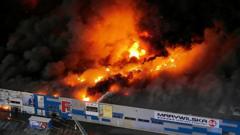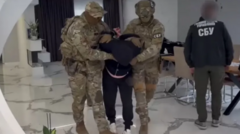Prime Minister Donald Tusk has confirmed the involvement of Russia in the significant fire that nearly wiped out the Marywilska shopping centre in Warsaw, stating that those responsible are in custody, with ongoing searches for others believed to be involved.
Poland Blames Russia for Arson Attack on Warsaw Shopping Centre

Poland Blames Russia for Arson Attack on Warsaw Shopping Centre
Polish officials assert that a devastating fire at the Marywilska shopping centre was an act of arson orchestrated by Russian intelligence services.
Poland has leveled serious accusations against Russia, claiming that intelligence services were behind a catastrophic fire that largely devastated the Marywilska shopping centre in Warsaw last year. In a statement on X, Prime Minister Donald Tusk declared that Poland is confident that the inferno was set intentionally at the behest of Russian special services. Tusk mentioned that some individuals linked to the incident are already detained, while authorities are actively pursuing others connected to the act.
So far, Moscow has refrained from commenting on Poland's claims, maintaining its stance of denying previous sabotage accusations across Europe. The fire, which occurred in May 2024, resulted in the destruction of around 1,400 small businesses, many of which were run by members of the Vietnamese community in Warsaw. After an extensive year-long investigation, Polish authorities concluded that the fire was orchestrated by a person in Russia whose identity has not been disclosed.
A statement from Poland's justice and interior ministries labeled the actions of those arrested as organized and directed by a specific individual residing in Russia. They also confirmed cooperation with Lithuania, where some of the alleged culprits reportedly executed similar acts of sabotage.
Since Russia's full-scale invasion of Ukraine in 2022, Poland has detained multiple individuals accused of conducting sabotage as agents of Russian intelligence, framing these incidents as part of a broader "hybrid war" instigated by Moscow. Hybrid warfare typically involves covert and deniable operations aimed at damaging the adversary's infrastructure without crossing the threshold of outright war.
NATO has echoed similar concerns, asserting that Russia is engaged in hybrid warfare across Europe to intimidate and deter Western nations from supporting Ukraine militarily. Russia has consistently denied allegations from NATO countries regarding its secret services partaking in sabotage activities in Europe.
In recent months, Lithuanian prosecutors also implicated Russia's military intelligence in an arson attack on an Ikea store in Vilnius, reinforcing suspicions of coordinated sabotage operations in the region. In response to these developments, Tusk noted that Lithuania has corroborated Poland’s concerns regarding Russian involvement in fires set at commercial establishments in both countries.
The Marywilska shopping centre, which opened its doors in 2010, not only housed shops but also safeguarded many important documents and considerable cash for local workers, as they feared theft at home. Following the fire, the owners managed to open a temporary shopping centre within three months, allowing approximately 400 traders to continue their businesses. Additionally, a replacement shopping centre, Modlinska 6D, was inaugurated in October 2024, welcoming relocated vendors.




















